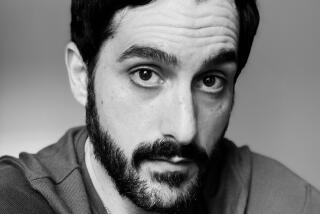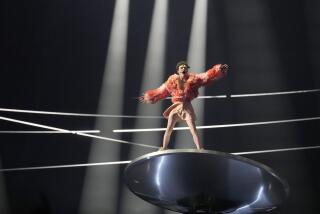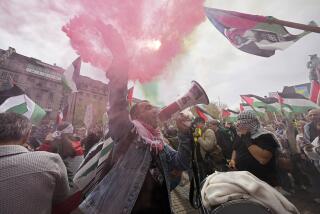Sour notes before Russia’s big moment on stage
- Share via
MOSCOW — First Georgia mocked Russia’s powerful prime minister. The Russians themselves caused the next scandal, making the nationalistic faux pas of picking a Ukrainian woman to represent them.
And then, just when Moscow had seemed to run out of post-Soviet squabbles, the gay community promised to pile yet another contretemps onto this spring’s Eurovision Song Contest.
The kitschy pop music competition to be held in Moscow in May should be a big moment for a country that has often chafed in its relations with the West. By playing host, Russia will have a chance to polish an image that’s been tarnished by war with Georgia and natural gas shutoffs to a shivering European Union.
But scandals started erupting months before the first note had been sung. Instead of showcasing hospitality, ebullience and the pop culture camp that Russia serves up so well, the competition has so far highlighted neo-Cold War feuds with the neighbors, latent nationalism and government homophobia.
Last weekend a jury chose Anastasia Prikhodko, a Ukrainian singer and alumna of a Russian reality show called “Star Factory,” to represent the country at Eurovision. She’ll perform a portion of her love song “Mamo” in her native tongue. A Georgian and an Estonian were reportedly involved in producing the song.
All three countries are former Soviet states that have shied away from Moscow’s influence, modeling themselves instead as allies of the United States and Western Europe.
Expressions of outrage were swift and bitter, especially from the losers. Complaints piled up on Russian websites.
“The significance of this stupid, kitschy pop concert in Russia and all of Eastern Europe and the former Soviet countries is enormously exaggerated,” said Artemy Troitsky, a prominent pop culture critic in Russia. “It’s very nationalistic, like a sports event where everybody is cheering for their own country and there’s a lot of chauvinistic feeling around the whole thing.”
Then there was Georgia’s entry, a song titled “We Don’t Wanna Put In,” a barely disguised jab at Russian Prime Minister Vladimir Putin.
“We don’t wanna put in,” the English chorus of the song by Stephane and 3G goes. “ ‘Cause negative move, it’s killin’ the groove.”
The song won by a landslide in the small Caucasian country, which is still reeling from last summer’s war with Russia. Eurovision officials were not amused. They ordered Georgia to change the lyrics or pick another entry.
Absolutely not, a defiant Georgia public television replied. Instead, Georgia quit the contest altogether.
“We want to say again that the song . . . carries no political implication,” read a letter from Georgian TV official Levan Kubaneishvili to Eurovision.
Kubaneishvili reminded contest officials of the Israeli band that sang about “demonic” and “crazy rulers” and the threat of nuclear war. Its 2007 entry was seen as a hostile message to Iran.
Meanwhile, gay rights activists have announced plans to parade through Moscow on the last day of the contest.
Moscow Mayor Yuri Luzhkov has made no secret of his distaste for gay pride marches. Permit requests are categorically denied, even though ultranationalist and white supremacist groups have been permitted to demonstrate.
Parade organizers recently complained to the European Court of Human Rights that the city has banned 155 planned gay pride marches. When gay rights activists tried to march in the streets of Moscow in 2006, they were beaten by skinheads, arrested by police and heckled by Orthodox priests.
The song contest is an improbable -- even laughable -- arena for serious social and geopolitical clashes. The name conjures up images of leather pants, leopard-skin prints and orange tans. The competition hit the pinnacle of its cultural relevance in 1974, when it brought the Swedish disco group ABBA to international attention.
But the Russian government is unlikely to welcome any further scandals; around here, Eurovision is serious business. Far from the tongue-in-cheek approach the contest tends to evoke in Western Europe, “it’s taken in a very serious way in Russia,” Troitsky said.
Last year, as Russia’s economy sank deeper into decay, Putin took the time to host Andrew Lloyd Webber at his dacha to discuss the competition.
On the streets, ordinary people still boast about the shaggy-haired Russian named Dima Bilan, who stormed onto the stage in Belgrade, Serbia, last spring and sang his way to first prize.
After Bilan won, Russian President Dmitry Medvedev phoned him in the middle of the night to offer congratulations. Putin sent a laudatory telegram calling Bilan’s victory “one more important triumph for all of Russia.”
--
More to Read
Sign up for Essential California
The most important California stories and recommendations in your inbox every morning.
You may occasionally receive promotional content from the Los Angeles Times.













